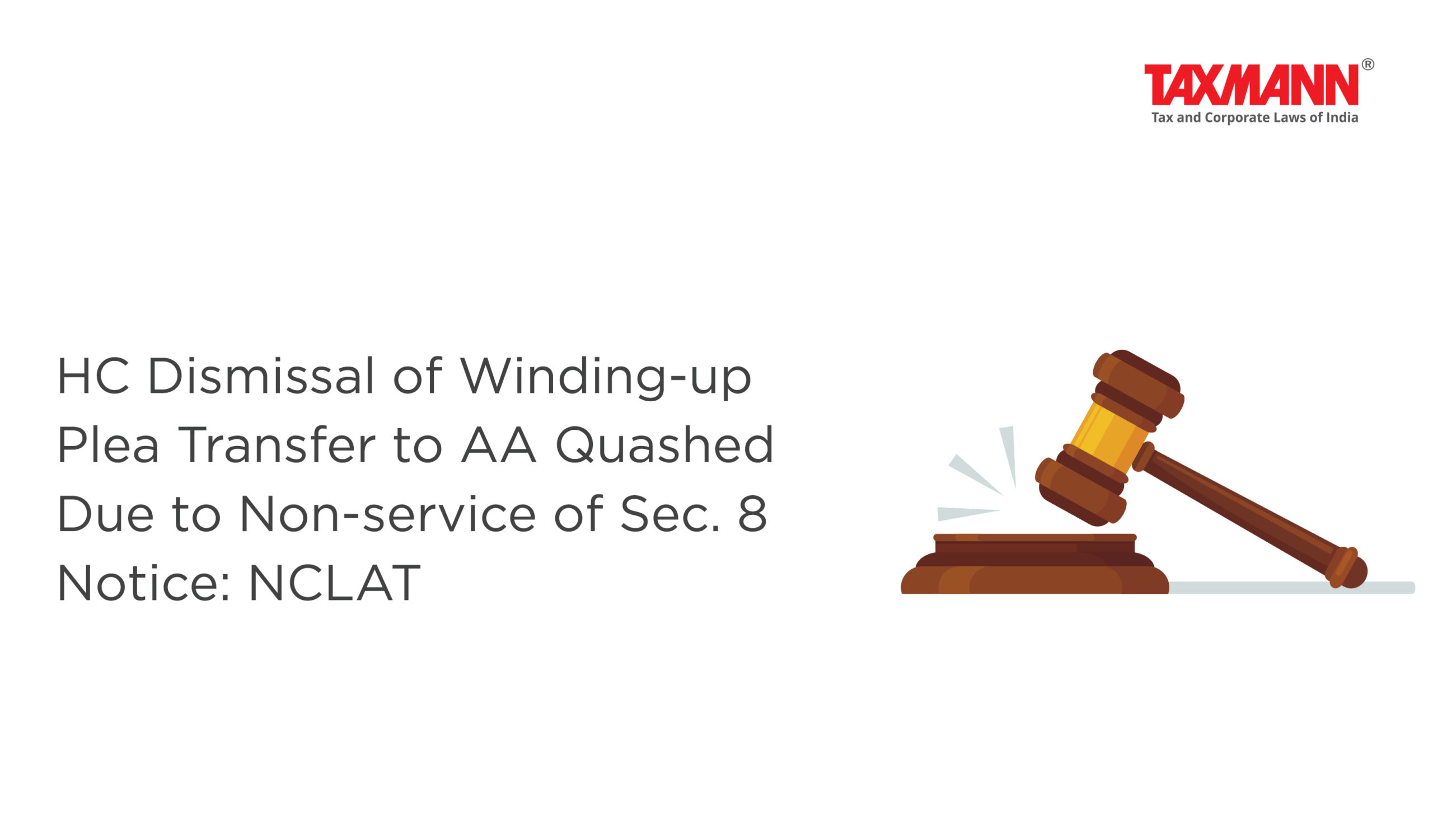HC Dismissal of Winding-up Plea Transfer to AA Quashed Due to Non-service of Sec. 8 Notice: NCLAT
- Blog|News|Insolvency and Bankruptcy Code|
- 3 Min Read
- By Taxmann
- |
- Last Updated on 7 June, 2023

Case Details: Indra Marshal Power (P.) Ltd. v. Akshaya Irrigation Products (P.) Ltd. - [2023] 150 taxmann.com 353 (NCLAT-Chennai)
Judiciary and Counsel Details
-
- M. Venugopal, Judicial Member & Kanthi Narahari, Technical Member
-
M.L. Lahoty, Adv. for the Appellant.
Facts of the Case
In the instant case, the operational creditor supplied goods to the corporate debtor, but despite several requests and demands, the corporate debtor failed to pay the due amount. As a result, the operational creditor sent a demand notice to the corporate debtor.
The operational creditor filed a petition seeking relief of winding up of the corporate debtor as it had failed to pay its liability. Later, the operational creditor filed an application before the High Court, seeking a transfer of the winding up petition to the Adjudicating Authority (NCLT) which was allowed and the Adjudicating Authority was directed to conduct further proceedings.
The NCLT transferred and renumbered the petition afresh and dismissed the same vide the impugned order on the ground of non-service of notice under section 8 by the operational creditor.
Thereafter, an appeal was made to the National Company Law Appellate Tribunal (NCLAT) against the order passed by the NCLT.
The operational Creditor vide instant appeal assailed the correctness of the impugned order and submitted that the proceedings so transferred were required to be dealt with an application for the CIRP with a mandate that the NCLT would proceed from the stage at which proceedings were transferred, without assuming any statutory compliance.
It was noted that in the instant case the ‘notice’ was not only served, but the winding up the petition came very near to the stage with the completion of pleadings by respective parties.
NCLAT Held
The NCLAT held that the Adjudicating Authority was required to follow the order of the High Court in its true letter and spirit. Since the Adjudicating Authority misdirected itself by making observations while passing the impugned order. Therefore, the same was to be set aside and Adjudicating Authority was to be directed to take the matter on its file and proceed further in accordance with the law.
List of Cases Reviewed
-
- Indra Marshal Power (P.) Ltd. v. Akshaya Irrigation Products (P.) Ltd. [2023] 150 taxmann.com 352 (NCLT – HYD.) (para 56) reversed [See annex].
List of Cases Referred to
-
- Forech (India) Ltd. v. Edelweiss Assets Reconstruction Co. Ltd. [2019] 18 SCC 549 (para 9)
- Mobilox Innovative (P.) Ltd. v. Kirusa Software (P.) Ltd. [2017] 85 taxmann.com 292/144 SCL 37 (SC) (para 15)
- Shital Fibers Ltd. v. Indian Acrylics Ltd. [2021] 126 taxmann.com 71 (SC)/2021 SCC Online SC 281 (para 16)
- 63 Moons Technologies v. Union of India [2019] 105 taxmann.com 6 (SC)/[2019] 18 SCC 401 (para 22)
- Ramco Systems Ltd. v. Spicejet Ltd. [2019] 105 taxmann.com 175/154 SCL 65 (NCLAT) (para 24)
- Deepak Gupta v. Ved Contracts (P.) Ltd. [Comp. App (AP) (Ins.) No. 1262 of 2019, dated 19-11-2019] (para 25)
- Karpara Project Engineering (P.) Ltd. v. BGR Energy Systems Ltd. [2019] 108 taxmann.com 502/155 SCL 289 (NCLAT) (para 26)
- Continental Carriers (P.) Ltd. v. Camson Agri-ventures (P.) Ltd. [Comp. App (AT) (Ins. No. 523 of 2019, dated 19-11-2019] (para 27)
- Hardeep Singh Sawhney v. Sawhney Builders (P.) Ltd. [Comp App (AT) (Ins.) No. 1147 of 2019, dated 18-11-2019] (para 32).
Disclaimer: The content/information published on the website is only for general information of the user and shall not be construed as legal advice. While the Taxmann has exercised reasonable efforts to ensure the veracity of information/content published, Taxmann shall be under no liability in any manner whatsoever for incorrect information, if any.

Taxmann Publications has a dedicated in-house Research & Editorial Team. This team consists of a team of Chartered Accountants, Company Secretaries, and Lawyers. This team works under the guidance and supervision of editor-in-chief Mr Rakesh Bhargava.
The Research and Editorial Team is responsible for developing reliable and accurate content for the readers. The team follows the six-sigma approach to achieve the benchmark of zero error in its publications and research platforms. The team ensures that the following publication guidelines are thoroughly followed while developing the content:
- The statutory material is obtained only from the authorized and reliable sources
- All the latest developments in the judicial and legislative fields are covered
- Prepare the analytical write-ups on current, controversial, and important issues to help the readers to understand the concept and its implications
- Every content published by Taxmann is complete, accurate and lucid
- All evidence-based statements are supported with proper reference to Section, Circular No., Notification No. or citations
- The golden rules of grammar, style and consistency are thoroughly followed
- Font and size that’s easy to read and remain consistent across all imprint and digital publications are applied



 CA | CS | CMA
CA | CS | CMA
